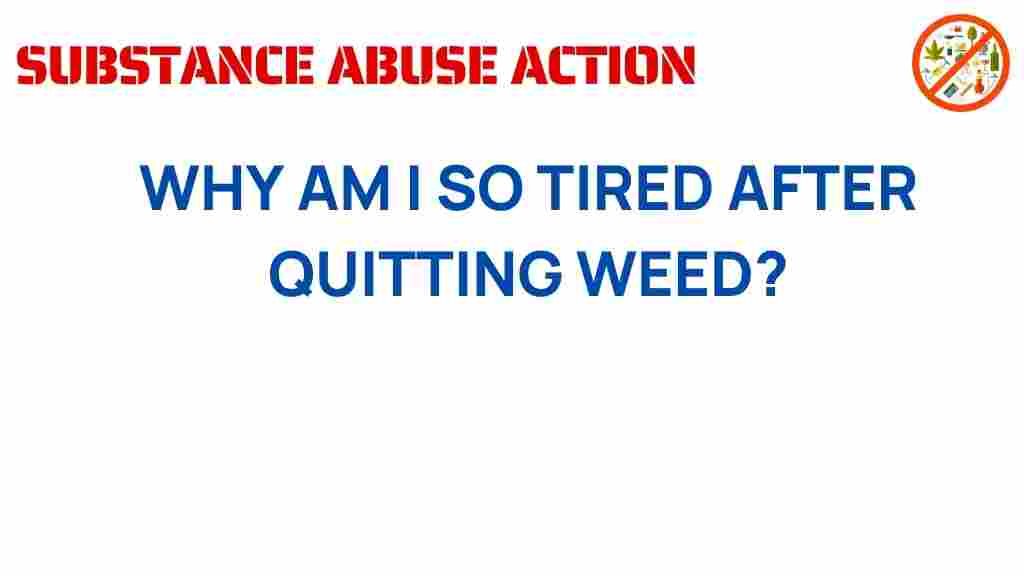The Hidden Struggles: Why Quitting Weed Leaves You Exhausted
Quitting weed can be a challenging journey, often filled with unexpected struggles. Many people assume that stopping cannabis use will be a straightforward process, but the reality is quite different. One of the most commonly reported issues during the recovery journey is fatigue. This article explores the reasons behind this exhaustion, the withdrawal symptoms associated with quitting weed, and how these factors affect mental health and energy levels. Additionally, we will provide some lifestyle changes that can help ease this transition.
Understanding Quitting Weed and Its Effects
When individuals decide to quit smoking weed, they may experience various withdrawal symptoms. These symptoms can include:
- Fatigue
- Anxiety
- Insomnia
- Irritability
- Loss of appetite
- Depressed mood
Among these, fatigue is particularly significant. Many people find that their energy levels plummet after they stop using cannabis, leading to a feeling of exhaustion that can persist for days or even weeks. Understanding the underlying causes of this fatigue is crucial for anyone undergoing the recovery journey.
The Science Behind Fatigue After Quitting Weed
The fatigue experienced after quitting weed is often attributed to several factors:
- Withdrawal Symptoms: When you stop consuming cannabis, your body goes through withdrawal. This can lead to physical and mental fatigue as your body readjusts to functioning without THC (tetrahydrocannabinol), the psychoactive compound in cannabis.
- Sleep Disruption: Many users rely on cannabis to help them sleep. Quitting can lead to insomnia and disrupted sleep patterns, which directly contribute to daytime fatigue.
- Changes in Brain Chemistry: Cannabis affects neurotransmitter levels in the brain, particularly dopamine and serotonin, which play roles in mood regulation and energy levels. The absence of these effects post-cessation can result in a temporary dip in energy.
- Psychological Factors: Mental health challenges, including anxiety and depression, can also manifest as fatigue. The stress of quitting can exacerbate these issues, leading to increased feelings of exhaustion.
Withdrawal Symptoms and Their Impact on Mental Health
Withdrawal symptoms can vary in intensity and duration, depending on factors such as frequency of use, amount consumed, and individual physiology. During the recovery journey, it’s essential to recognize how these symptoms can impact mental health.
Coping with Withdrawal Symptoms
Here are some steps to cope with withdrawal symptoms effectively:
- Stay Hydrated: Drinking plenty of water can help flush out toxins and reduce fatigue.
- Practice Good Sleep Hygiene: Establish a calming bedtime routine to improve sleep quality. This may include limiting screen time and creating a comfortable sleeping environment.
- Engage in Physical Activity: Regular exercise can boost energy levels and improve mood, helping to combat feelings of fatigue.
- Eat a Balanced Diet: Nutrient-dense foods can provide your body with the energy it needs to recover from withdrawal.
- Seek Support: Joining support groups or talking to a therapist can help you manage the emotional challenges of quitting weed.
How Lifestyle Changes Can Help
Making lifestyle changes is essential for anyone quitting weed. These changes not only aid in the recovery process but can also enhance overall well-being and energy levels.
Implementing Positive Lifestyle Changes
Consider incorporating the following lifestyle changes into your daily routine:
- Mindfulness and Meditation: Practicing mindfulness or meditation can reduce stress and enhance mental clarity. This is particularly beneficial during the recovery journey.
- Establish a Routine: Creating a daily schedule can provide structure, reducing anxiety and promoting a sense of normalcy.
- Limit Caffeine: While it might be tempting to reach for coffee to combat fatigue, excessive caffeine can lead to increased anxiety and disrupt sleep.
- Connect with Nature: Spending time outdoors can improve mood and energy levels. Nature has a calming effect that can help reduce stress.
- Engage in Hobbies: Find activities that bring you joy and keep your mind occupied. This can be anything from painting to hiking or reading.
Addressing Energy Levels During Recovery
One of the biggest challenges during the recovery journey is managing fluctuating energy levels. Here are some tips to help maintain your energy:
- Break Tasks into Smaller Steps: When you feel fatigued, large tasks can seem overwhelming. Break them down into smaller, manageable steps to avoid burnout.
- Rest When Needed: It’s important to listen to your body. If you feel tired, allow yourself to rest or take a nap.
- Set Realistic Goals: Don’t push yourself too hard during the initial stages of quitting. Focus on gradual progress.
- Incorporate Relaxation Techniques: Deep breathing exercises, yoga, and other relaxation techniques can help reduce fatigue and improve mental clarity.
Support Systems for Your Recovery Journey
Building a support system is vital for anyone quitting weed. This can include:
- Family and friends who understand your journey.
- Support groups, either in-person or online, where you can share experiences and advice.
- Professional help from therapists or counselors specializing in addiction recovery.
Connecting with others who have gone through similar experiences can provide motivation and encouragement during tough times. For more information and resources on recovery, you can visit this helpful guide.
Conclusion
Quitting weed is a significant step towards better mental health and a healthier lifestyle. However, the hidden struggles, including fatigue and withdrawal symptoms, can make this journey challenging. By understanding the reasons behind these feelings and implementing positive lifestyle changes, you can navigate the recovery process more effectively. Remember that it’s essential to be patient with yourself and seek support when needed. While quitting weed may leave you feeling exhausted at times, the long-term benefits are well worth the effort. Embrace the journey of recovery, and take it one day at a time.
This article is in the category Recovery and created by SubstanceAbuseAction Team
